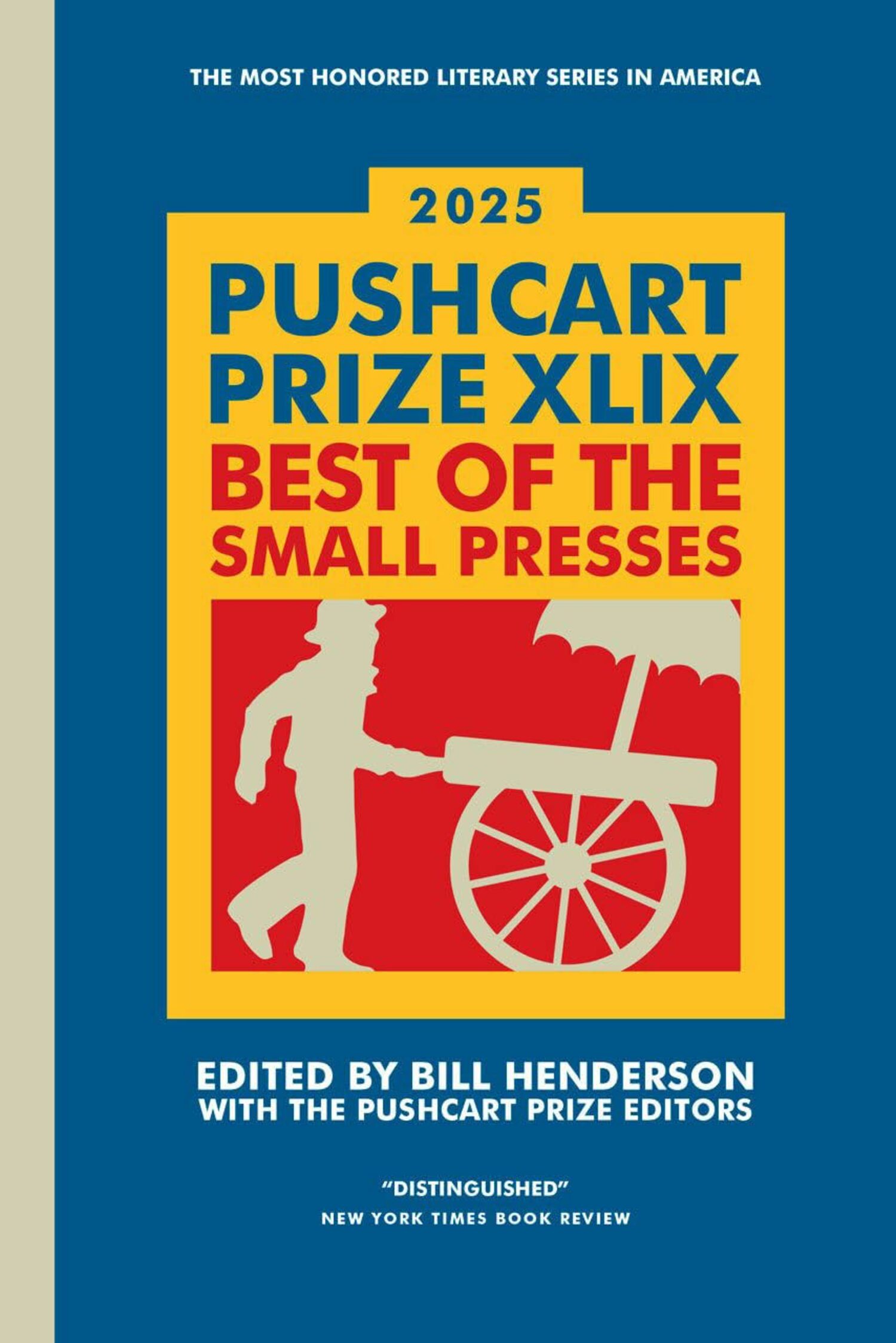
Bill Henderson is counting on readers old enough to decipher XLIX, the newest edition of the Pushcart Press’s (PP) “The Pushcart Prize: Best of the Small Presses” and savvy enough to recognize some of the indies whose submissions won inclusion, not to mention the names of some of the winning fiction writers, poets, essayists and memoirists who democratically share this volume with newcomers and unknowns.
The paperbound tome comes with rough-cut edges that traditionally signal excellence and appendices containing press addresses, brief notes on contributors and a list of previous appearances for both authors and presses. This year, out of 8,000 nominations, PP editors selected 71 pieces from 54 presses, along with notices of Special Mentions. Henderson calls the results “this small good thing.”
Fans of PP annuals, whose covers still feature a silhouetted man with pushcart and umbrella, will enjoy the new volume because it’s as timely and significant as ever, reflecting in diverse ways Henderson’s philosophy — which is to honor writers who write with the “love” and “wonder” that once upon a time inspired most literary artists — namely, the desire to engage in creativity over commerce, exhibit care for community and seek out the humane in what still remains of it in a book world that seems to favor trendy gossip, lies, narcissism and escapist horror.
Today, as everyone knows, it’s difficult without connections (and even then) to get published by trade presses that mainly have money on their minds in the form of big time reviews, film adaptations and sales abroad. Uniquely, PP relies on volunteer editorial staff and supporters and is likely the only institution that bestows prizes that have no monetary attachment. Getting in or almost getting in is all. Citing publication or special mention is important enough that many aspiring authors list PP on their résumés.
Of course, it’s impossible to cover all the contributions, but a few examples may serve as teasers: the book ends — the fiction that opens and closes the volume and a couple of poems — that seem especially to express Henderson’s hope that their expression of faith and courage, even when sardonically offered, might counter acknowledged pain and despair. Or inspire rebellion, as in “Gary’s Way” by Andre Dubus III (Ploughshares), a fascinating present-tense confession by the wife of a once-sensitive, loving husband who’s gone extreme right-wing hate rogue and was part of recent riots at the Capitol. She’s turning him in to the FBI.
In some cases, it may be the recommender who’s a draw, as is Frederic Tuten, who submitted the story, “Good Medicine” by Sophie Hoss, an MFA student at Stony Brook, which appeared in The Baffler. Tuten, a PP editor, contributor and Hamptons native known for his eccentric characters, oddball settings and surreal situations, has selected a writer who seems to have similar qualities. Here’s Hoss’s opening: “After my father died in the mine shaft, they left his body on our front yard next to the white roses. The milkman stepped over him to drop our bottles on the stoop and rapped on the door for my mother: Ma’am, there’s something you should see. I was four.” From there, it’s a moving sequence of droll scenes and memories that for all their apparent lack of relationship, yet leads to contentment.
The poems, some 14 liners, but not sonnets, seem to reflect times that seemed cohesive, yet were not, but in their acknowledgment of difficulty, show strength. An example is “A Skillet Poem,” a blank verse lyric by José B. González that appeared in Here: A Poetry Journal, in which the author slyly acquiesces in someone’s telling him to stop submitting poems about his mother and grandmother, but he does so by focusing this time on a frying pan and its role in stopping physical abuse.
Sometimes it’s the imaginative structure that stands out, as in “Glossary of Centralia, Pennsylvania” by Abby Manzella (The Threepenny Review). This is a kind of Devil’s Dictionary of the horrors hard coal visited on a once-viable community, the last entry of which is zip code 17927: “the now defunct mailing code for Centralia, Pennsylvania,” This deserves a reading out loud in Congress.
And then there are the bookends. The lead-off story, “Epithalamium” by Bill Roorbach (The American Scholar), a whimsical tale about a stray dog, confidence and love. A handsome dog on the loose enters the life of an ordinary, if timid, photographer, and becomes Mick Jagger, the inner voice of the protagonist, encouraging him to take risks, including finally doing without him. It’s arguably the last entry in the volume, however, that is likely to make the deepest impression — “Blackbirds” by Lindsay Drager (The Colorado Review). An exquisite, quietly heroic narrative told through the eyes of an eight-year-old asthmatic youngster, “she” is left mostly on her own by a depressed mother and a traveling father. She finds herself assuming the care of her baby brother, in between having breathing attacks and trying to attend to schoolwork — learning particularly how to tell time on an analog clock. Intuitively, protectively, repeatedly, she does the right thing, knowing she is lying to protect her parents. Only in the last section does the title kick in, as the young girl sees a huge flock of blackbirds on the roofs of other houses and wonders if they’re on hers, as well. Trapped by her own compassion, with a desire to flee and to know the larger world outside her house, she seems to exemplify Henderson’s faith in the power of literature and human beings.